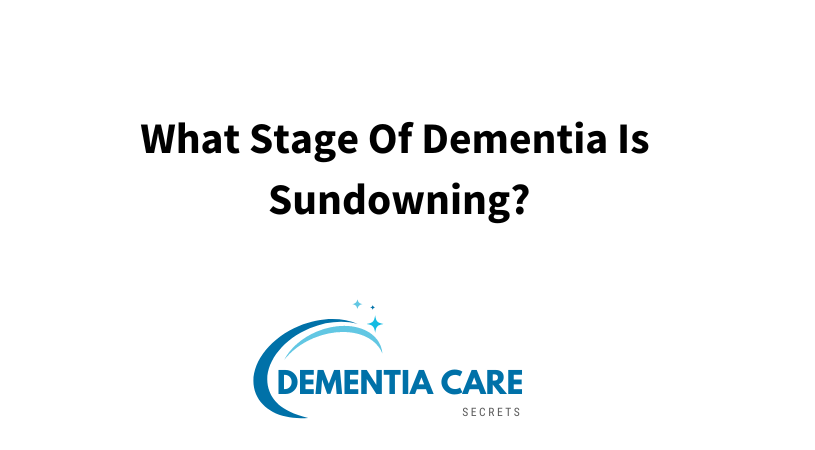What Stage Of Dementia Is Sundowning?
Sundowning occurs when a person's mood, personality, or behavior changes in the late afternoon or early evening. Doctors are unsure why this happens, but it affects roughly one in every five dementia patients.

I want to make my listeners aware that there are many different types of dementia and they all have predictable stages. Not all individuals with dementia will develop sundowners syndrome.
At What Stage Does Sundowning Start?
The symptoms and stages of dementia progress in a predictable manner. But, as I have said before every case of dementia is unique. Patients that have symptoms that worsen as the day goes one, especially as the sun goes down, is known as sundowners syndrome.
Sundowners syndrome is not clearly understood. There are however specific symptoms to look out for and simple approaches to decrease the behaviors.
What Is Sundowning?
Sundowning occurs when a person's mood, personality, or behavior changes in the late afternoon or early evening. Doctors are unsure why this happens, but it affects roughly one in every five dementia patients.
Scientists believe the chemical changes that occur in the brain with dementia affects the patient’s internal clock, the circadian rhythms , if you will. causing the part of the brain that signals when you are awake or sleeping to malfunction.
The sun going down, low light , symptoms of depression and boredom, pain and sleep problems are thought to contribute at setting it off.
The mental and behavioral symptoms a person with dementia exhibits worsen when a patient it sundowning
Those suffering with sundowners syndrome may follow their family caregiver around and even mimic your movements. They may ask the same questions over and over again, forgetting your response. There are some that temporarily lose their ability to communicate. Some patients become extremely restless, agitated. They will pace for hours, some may even try to leave the house and wander aimlessly.

Now let's discuss Sundowners Syndrome Common Symptoms
Early symptoms can be very subtle. inconsistent, and difficult to detect.
Many become demanding, Restless and agitated, they become irritable. Confusion and disorientation grows as the day goes on.
They become suspicious of others, making false accusations.
These symptoms become more pronounced and regular as the condition progresses.
Sundowning symptoms typically peak in the late afternoon and can last well into the night.
Common Symptoms of Sundowning:
• Anger
• Depression
• Anxiety
• Agitation to the extreme
• Fear
• Delusions
• Outbursts of Emotion
• Paranoia
• Hallucinations
• Crying
• Pacing versus wandering
• Restlessness
•Objects Hidden
•Rocking
•Sleeping Problems
The onset of symptoms and individual behaviors will vary from patient to patient. Symptoms frequently interfere with sleep. Sleep deprivation can cause recurrent episodes of sundowning.
What Causes Sundowners Syndrome?
Studies reveal up to 20% of dementia patients experience worsening confusion, agitation, and anxiety in the afternoon or evening. As I said before doctors do not fully understand sundowners syndrome or its underlying causes. There are some potential triggers have been identified.
Contributing factors include:
• Sensory deprivation or sensory overload (e.g. too little or too much light)
• Unmet physical requirements (e.g. hunger, pain, fatigue)
• Mobility issues
• social isolation
• Increased Stress
• Decreased sense of security
• Have a fear of danger
• Anxiety, apprehension, or depression
• Unfamiliar surroundings
• Or have an unexpected change
• Circadian rhythm disruption, sleep deprivation

Treating Sundowners Syndrome
The first step in treating and managing sundowning symptoms is to confirm that it is sundowners syndrome and not a condition known as delirium.
Delirium is a medical disorder that causes mental confusion as well as changes in attention span, perception, mood, and level of activity.
People with dementia are predisposed to developing delirium.
The best way to tell if your family member has delirium versus sundowners syndrome is pay attention to the timing.
What is Delirium?
Delirium is a condition that develops quickly over days or weeks, rather than months or years.
The associated confusion and behaviors fluctuate throughout the day rather than in a predictable late afternoon or early evening pattern.
How to Manage a Family Member that is Sundowning
There are steps you can take to both prevent and manage sundowners syndrome.
The most important thing to remember is patience is a virtue. When you are caring for someone with dementia, you will be challenged.
Dementia patients as they decline, lose memories. They have lost the ability to remember the past or think about the future. They live in the here and now. They will pick up on how you are feeling, So, be aware of your emotions, Feeling frustrated or angry will be picked up by your family member with dementia, They have also lost their ability to reason.
So, put your frustrations aside. Take whatever steps necessary to reduce the triggers and behaviors of sundowning.

Simple Tips for Dealing with Sundowning:
•Maintain a calm demeanor.. Avoid raising your voice or making any sudden movements.
•In order to identify any unmet needs, try to ask questions.. Avoid asking them to explain things that do not make sense to you.
•Keep the curtains closed throughout the day. This is to prevent any changes in light from triggering an episode. Adequate lighting can decrease the anxiety that occurs as the sun goes down.
•In the afternoon and evening, provide a peaceful calm environment with few distractions. I suggest that you keep the TV off, avoiding the news. Instead consider putting on some calming music.
•Keep your family member with dementia active and busy during the day. This is to increase the chances that they will be tired enough to sleep at night. Try to prevent them from taking long naps, especially in the afternoon.
•Develop a daily routine and stick to it. This will help your family member stay on track and reduce anxiety.
•In the afternoon and evening, engage your loved one in relaxing activities such as watching a movie, listening to music, or playing a card game, or folding laundry
•You may want to consult your doctor about potential medications that could help with the various symptoms. Sundowning medication may include anti-anxiety and hypnotics.
I will recommend that you consider medications as a last resort. The medication ordered by your doctor may have the opposite response you want . I’ve seen it many times. Medications made to sedate and calm in some, can cause increased anxiety and agitation in others. If you do decide to introduce medications, start at the smallest dose possible. Then increase , until the desired response is accomplished.
I do recommend also exploring non-pharmacologic options such as, light, music, massage and aromatherapies . See what works for your family member. Some of the results will likely vary and may or may not alleviate symptoms.
Research indicates that sundowning often occurs during the middle or late stages of dementia for those wondering at what stage of dementia sundowning occurs.
With this information, I hope that caregivers will be prepared to deal with the with the family member with dementia that suffers with sundowning.
You might also like this article:







